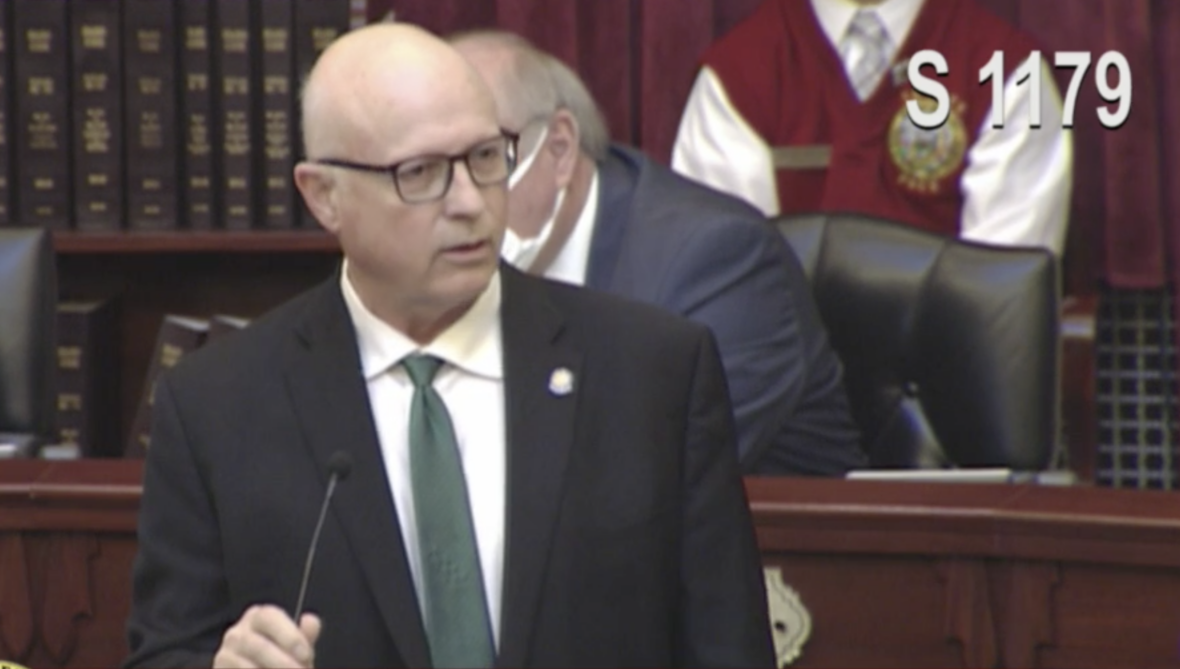
After spirited debate about campus social justice programs — and whether a $409,000 funding shift sent enough of a message — senators approved a higher education budget Wednesday.
All told, the budget would carve up $631.4 million for the four four-year institutions, including $315.2 million of state tax dollars. But much of the debate centered on a $409,000 shift from Boise State University to Lewis-Clark State College, to take away dollars Boise State had spent on social justice programs.
The budget bill’s floor sponsor, Sen. Carl Crabtree, R-Grangeville, described the budget as a common-sense first step to rein in the four-year institutions.
“Frankly I don’t think our voice has been heard adequately by our colleges and universities,” he said.
Crabtree said the $409,000 shift was not arbitrary, but instead reflected what Boise State said it had spent on social justice programs. And he noted that the budget will require the four schools to report all social justice spending to the Legislature in January. “They’re going to get the message.”
Some Senate conservatives were unconvinced.
Sen. Christy Zito, R-Hammett, urged senators to strip down the higher education budget and support a mission of producing “job-ready people.” Sen. Steve Vick, R-Dalton Gardens, said the budget fell short because it failed to address systemwide social justice issues. “It only sends a message to Boise State University.”
Three Boise Democrats said they were voting for the budget, despite the $409,000 cut to Boise State. “I think we’re in dangerous territory,” said Sen. Melissa Wintrow. “I think that borders on censorship.”
The bill passed 27-6, with dissenting votes coming from Republicans Regina Bayer, Meridian; Kevin Cook, Idaho Falls; Lori Den Hartog, Meridian; Doug Ricks, Rexburg; Vick; and Zito. The measure now goes to a more conservative House — which voted down two higher education budget bills in 2020, before finally agreeing on a spending plan.
Senators preserve August school election date
School districts will still be able to run bond and levy elections in August, after a vote in the Senate State Affairs Committee Wednesday.
The committee killed a bill that would have eliminated the August election date — one of four days when school districts can bring ballot measures before voters.
The voice vote came after Senate President Pro Tem Chuck Winder said the election debate was a symptom of a much larger issue: a state K-12 budget that leaves more than 90 school districts reliant on voter-approved supplemental levies.
“I wouldn’t say it’s criminal that we have to have supplemental levies, but it’s pretty close to that,” said Winder, R-Boise.
In many ways, Wednesday’s committee hearing was a reprise of a hearing in the House State Affairs Committee in February.
West Ada School District chief financial officer Jonathan Gillen and Middleton School Board Chairman Kirk Adams told senators that their districts’ August levies helped head off staff cuts for 2020-21. The Idaho School Boards Association and the Idaho Association of School Administrators both spoke against the bill, reminding committee members that the districts had agreed several years ago to a consolidated election calendar.
“(This) feels completely unfair to us,” said Quinn Perry, policy and government affairs director for the ISBA.
Deputy secretary of state Jason Hancock again pushed for House Bill 106, saying it would give counties a much-needed summer pause in the elections cycle — time they could use for training or checking voter rolls. While only nine to 12 counties a year conduct August elections, counties such as Canyon and Madison have been running elections every August for several years.
“It’s a pace that they didn’t have to run at 10 years ago,” Hancock said.
While the debate was a rerun, the outcome was different. A month ago, House State Affairs endorsed House Bill 106 on nearly a party-line vote, setting the stage for the bill to pass the House 45-24.
Second House Ed member tests positive for COVID-19
Rep. Ryan Kerby, R-New Plymouth, tested positive for COVID-19 after appearing in-person at the Statehouse Tuesday, Betsy Russell of the Idaho Press reported.
Kerby, House Education’s vice chairman, is the second House Education member out with COVID-19 this week. On Monday, Chairman Lance Clow was absent after a positive COVID-19 test.
Kerby sits near Clow in the committee room, where Republican representatives rarely wear masks. Though Clow was absent Tuesday, Kerby was in committee, maskless, and coughing during the House Education meeting. He got tested for COVID-19 later in the day, he told Russell.
“I had a little bit of a cough, and I always have a cough in the winter time,” Kerby told Russell. “… I can’t believe I have it.”
Kerby’s seat is being filled by Dan Greig, of Fruitland, for “as long as necessary.”
Kerby is at least the fifth legislator to test positive for COVID-19 during the in-person 2021 session.
Sex-ed bill pulled from Senate Ed agenda
The Senate Education Committee abruptly pulled a controversial sex education “opt-in” bill from Wednesday’s agenda — leaving the bill’s prospects in limbo.
Senate Education Chairman Steven Thayn, R-Emmett, the bill’s Senate co-sponsor, was absent Wednesday. He missed Wednesday morning’s Senate floor session, and was not chairing Wednesday afternoon’s committee meeting.
The delay could be significant, at this late stage of the session. Thayn has said he hopes to wrap up the committee’s work this week, as the session nears a possible adjournment. The committee meets again Thursday, but the sex ed bill is not on Thursday’s agenda either.
Rep. Barbara Ehardt, R-Idaho Falls, the sex ed bill’s lead sponsor, did not immediately respond to a text from Idaho Education News.
Ehardt’s House Bill 249 would allow parents to opt their kids into sex ed courses, replacing the current opt-out policy. It passed the House on March 5 along party lines.
Check back throughout the day for more Statehouse updates.
Idaho Education News covered Wednesday’s hearings remotely.
